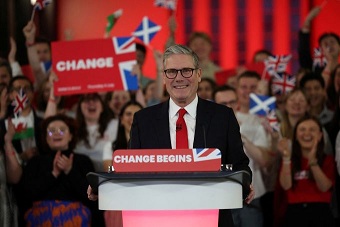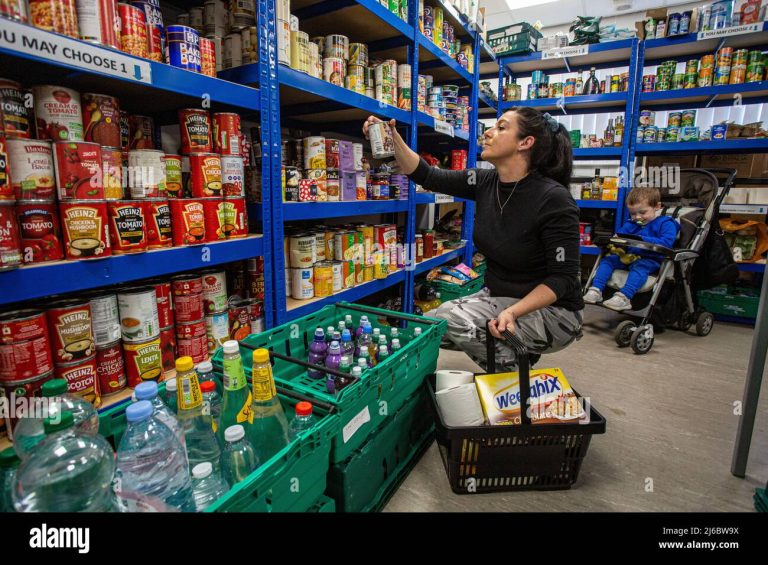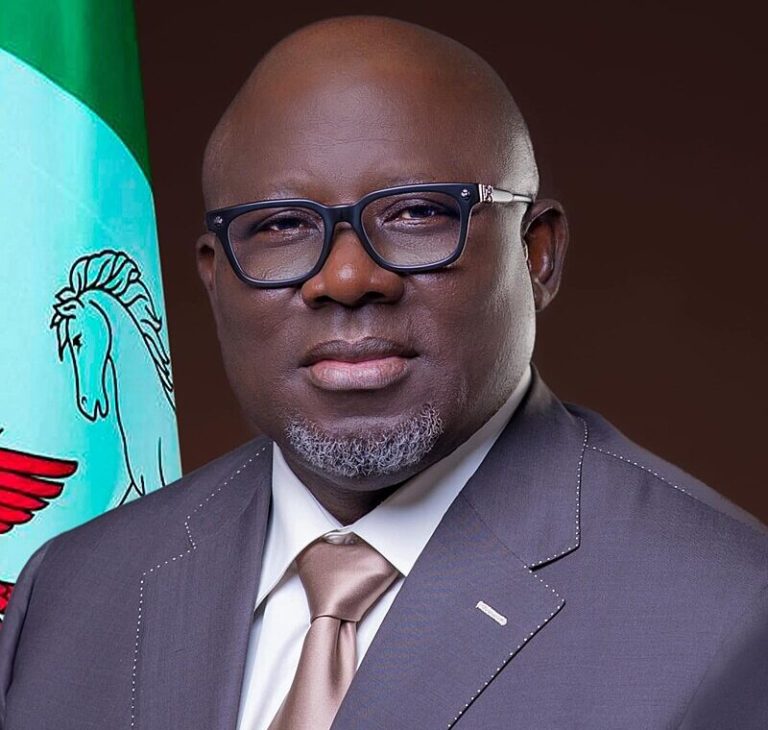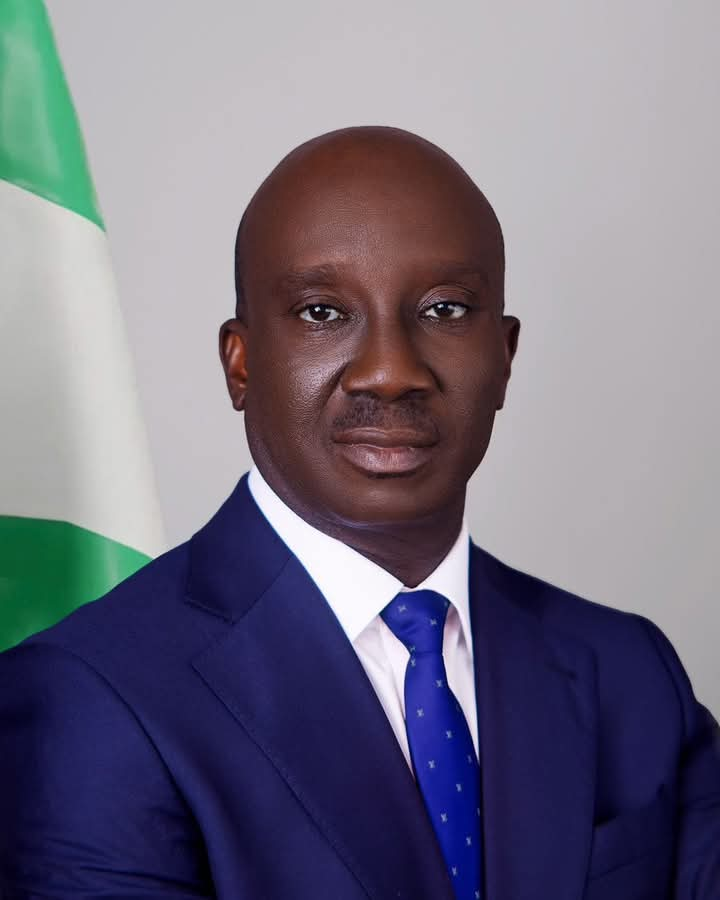
Keir Starmer addresses his supporters at a reception to celebrate his win in the election, at Tate Modern, London, Britain, July 5, 2024. REUTERS/Suzanne Plunkett
Compiled by Kingsley Abavo (Managing Editor), Benin
Source: CNN
The Labour Party (LP) in a landslide has won the UK general election contest announced early hours of Friday morning, July 5, 2024 with its candidate; Keir Starmer, emerging as the new Prime Minister.
It is 14 years, Gordon Brown led Labour last held the reins of power from 1997 to 2010.
Starmer, new leader of Britain’s Labour Party pledged to steer the country towards “calmer waters” after 14 often turbulent years of Conservative rule, in his first address to the nation.
The center-left Labour won the election by a landslide, securing the biggest majority in its history.
Celebrating the victory in front of supporters at the Tate Modern art gallery in London on Friday afternoon, Starmer asserts; “Change begins now. It feels good, I have to be honest!
“You have given us a clear mandate, and we will use it to deliver change, to restore service and respect to politics, end the era of noisy performance, tread more lightly on your lives, and unite our country,” Starmer said.
“If I asked you now whether you believe that Britain will be better for your children, I know too many of you would say no,” he said, pledging to fight “until you believe again.”
Starmer promised; his government would try to “defy, quietly, those who have written our country off.”
Adding; that the four nations of the United Kingdom would stand together as they confront “the challenges of an insecure world, committed to a calm and patient rebuilding.
“When the gap between the sacrifices made by people and the service they receive from politicians grows this big, it leads to a weariness in the heart of a nation, a draining away of the hope, the spirit, the belief in a better future, that we need to move forward together.“
This wound, Starmer noted, “can only be healed by action, not words.”
Hence he intends to start work right away “with the simple acknowledgement that public service is a privilege and that this government should treat every single person in this country with respect.
“With respect and humility, I invite you all to join this government of service in a mission of national renewal. Our work is urgent, and we begin it today,” he said.
Keir Starmer 61, replaces Rishi Sunak of the Conservative Party.
He has promised to be the agent of change that Britain needs; pledging to grow the country’s economy by reforming planning laws and investing in a new industrial strategy.
He has said he will set up a national wealth fund with £7.3 billion ($9.2 billion) of public money that will help pay for the transition to net zero emissions.
An £8.3 billion ($10.5 billion) publicly owned energy company, Great British Energy, will see the United Kingdom’s energy grid decarbonized by 2030.
Starmer says all these can be achieved without raising income taxes, though there are no commitments on other levies, such as capital gains tax, which is paid on money made from selling assets, including property and shares.
The rest of the Labour manifesto comprised a mix of modest centrism with soft socialism.
It included imposing taxes on private schools to help pay for state education and windfall levies on energy companies, to fund the transition to clean energy.
There were also commitments on workers’ rights, cutting waiting lists for health care and also controlling immigration.
It was clear going into this election campaign that Britain was screaming out for change after 14 years of Conservative rule; that saw cuts in public spending, stretched public services, the chaos of Brexit, a cost-of-living crisis and a sitting prime minister fined by police while in office for the first time in history.
The Conservative Party lost more than 250 seats; its worst-ever defeat, and now faces life in opposition.
With the outgoing PM, Rishi Sunak pledging to resign as party leader and several cabinet ministers lost their seats, as did former PM Liz Truss.
Reform UK Party
Meanwhile, Nigel Farage’s populist Reform UK party won its first seats and came second in many more, splitting the right-wing vote and contributing to the Conservatives’ losses.
This is as the Liberal Democrats will be the third biggest party in parliament, after its best result in years.
The Greens made gains while the Scottish National Party suffered a collapse, losing nearly 40 seats, most of them to Labour.
Reform UK Leader Nigel Farage attends a press conference in London, England, on July 5. Victoria Jones/Shutterstock
Nigel Farage from the right-wing; start-up Reform UK party
Farage, known for his leadership in the UK’s Brexit campaign and his close ties with former President Donald Trump, won his first seat in parliament in Thursday’s vote, along with at least three others from the Reform party.
He took a jibe at newly-elected Prime Minister Keir Starmer, saying that, although Labour won by a landslide in terms of seats in parliament, the popular vote showed the party’s win was not a resounding victory.
Despite the Labour landslide, Starmer’s party only increased its vote share by a few percentage points from its dismal 2019 showing, Farage held.
How return of Farage created nightmare for the Tories
After Britain left the European Union in 2020 – a cause he had championed for three decades – Nigel Farage retreated from frontline politics. When his fledgling Brexit party renamed itself as Reform UK, he slunk into the role of party chairman – still a political force, but a dormant one.
Just weeks ago, it looked set to stay that way. Farage initially said he would not stand in this election, and that he would instead “help with the grassroots campaign” in the US, presumably to try to reelect former President Donald Trump.
This came as a relief to the Conservatives, who had long feared losing their more right-wing voters to Reform.
But, lacking a recognizable leader, Reform looked set to be a disparate protest vote, failing to pose a real electoral challenge to the Tories.
Then, everything changed. Farage said at the start of June that he was set to make an “emergency announcement,” striking fear into Conservative HQ.
“I’m back to lead a political revolt,” he said later that day, announcing that he will stand in the deprived coastal town of Clacton.
He went on to win the seat comfortably, finally being elected Parliament after seven unsuccessful attempts.
Farage’s return injected energy into the Reform campaign and skewed the electoral arithmetic.
While Reform won just four seats, it secured millions of votes, potentially costing the Conservative dozens of constituencies by splitting the vote on the right.
In the past, the Conservative Party has seen off the Faragist threat by adopting his policies. The much-diminished party now faces a similar choice: Does it try to bury Reform, or bed it?
Prominent Conservatives lose their seats
The Tories have had a tough night, suffering the biggest defeat since the party was formed. Among the top brass Conservatives losing their seats: the former (albeit short-lived) Prime Minister Liz Truss, House of Commons leader Penny Mordaunt, Defense Secretary Grant Shapps and Justice Secretary Alex Chalk.
Rishi Sunak pleads with Conservatives
Sunak to step down: The outgoing prime minister said that he will leave his post as leader of the Conservative party in an address to the British public outside Downing Street.
“I have heard your anger, your disappointment, and I take responsibility for this loss,” Sunak said after delivering the party’s worst-ever defeat.
Reform UK makes breakthrough
An insurgent rightwing populist party led by the Nigel Farage secured four seats, with Farage himself getting into the parliament for the first time – after running seven times in the past.
Liberal Democrats reborn: The Liberal Democrats were on course to secure their best result ever – and will return as Britain’s third-biggest party in Westminster. They unseated several high-profile Conservatives.
Greens quadruple their seats: The Green Party won four spots in the Parliament, gaining three more seats compared to the last election in 2019.
SNP wipeout: The Scottish National Party has suffered big losses in Scotland, likely putting the question of an independent Scotland to rest for now. Labour took a host of seats from the party.
Low turnout: Turnout is on track to be the lowest for more than 20 years. Of the seats declared by early Friday morning, turnout is hovering just below 60% – down from 67.3% at the last election in 2019.
What will Keir Starmer’s leadership mean for the world?
• Analysis by Luke McGee, CNN
Ever since the UK voted to leave the European Union in 2016, there has been a perennial debate about Britain’s place in the world.
There are some who believed that Brexit would lead to the UK having a diminished voice on the world stage, despite still being a permanent member of the UN Security Council, a G7 economy and a nuclear power.
It’s hard to quantify exactly how much power any country has, but arguably the biggest hindrance to the UK’s international influence, has been the domestic political chaos and instability since 2016.
The logic goes that if you cannot provide certainty at home, what you say on international issues doesn’t carry much weight.
Diplomats often point to the relative stability of a country like Ireland, whose political consistency, particularly on foreign affairs, affords its diplomats disproportionate heft, compared to say Australia, who went through a period of political instability which saw it lose influence.
It’s not an exact science, but political stability matters to your allies. Starmer can now as well guarantee five years of consistency to the world, which will mean his views on foreign affairs can be taken seriously.
On Ukraine; Starmer is expected to maintain the UK government’s support.
He has said Israel has a right to defend itself, but it is expected that he will come under pressure to restrict arms sales if they are being used to commit war crimes.
He has said that he wants to improve the UK’s relationship with Europe, but has ruled out rejoining the EU or any of its institutions.
Critics on the right say that Starmer will need to raise taxes to fund his plans, while skeptics on the left say his manifesto is not bold or ambitious enough to change Britain for the better.
In short, this is a long list of things to sort out in a five-year term when public finances are in disarray.
The question for Starmer now is whether the mess is too big for him to fix and whether he has the political skill to bring about the change he promised.
Starmer makes first appointment
Rachel Reeves has been appointed by Keir Starmer as the UK’s new Chancellor of the Exchequer, or finance minister, becoming the first woman to hold the role.
The daughter of teachers, Reeves studied politics, philosophy and economics at Oxford University before taking a graduate job at the Bank of England, initially tasked with analyzing how Japan attempted to emerge from its period of stagnation in the 1990s.
Britain’s economy today faces a similar challenge.
Who is Keir Starmer?
On paper, the 61-year-old Starmer looks like a classic establishment figure.
Once a leading human rights lawyer, he became Director of Public Prosecutions (DPP) in 2008, running the Crown Prosecution Service of England and Wales – a high-profile job for which he was knighted, making him the first ever Labour leader to enter the job with the prefix Sir to his name.
Starmer, however, is by the standards of modern political leaders; from relatively humble beginnings.
Born in 1962, Starmer grew up in a small town to the south of London. His father was a toolmaker who worked in a factory, his mother was a nurse who suffered with severe physical disabilities, which ultimately led to one of her legs being amputated.
While Starmer has never claimed to have suffered poverty, he has talked of financial struggles that affected his family, as well as the learning difficulties that held back his younger brother.
Clearly, these early experiences shaped Starmer’s politics. He has talked about noticing people looking down on his father for working in a factory or bullying his brother. His parents were political, naming their eldest after the first Labour leader in parliament, Keir Hardie.








